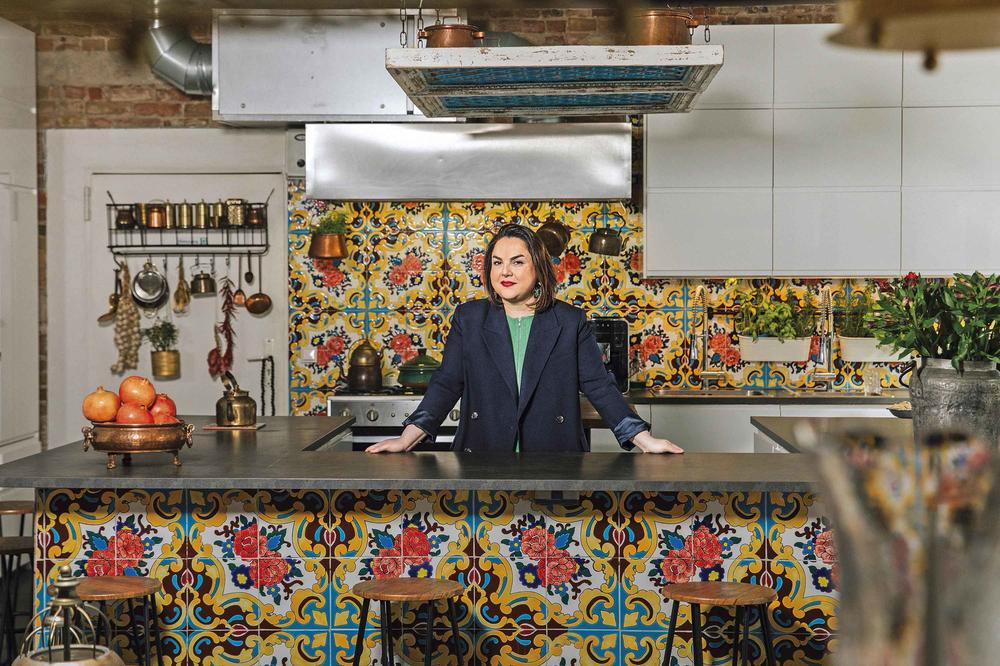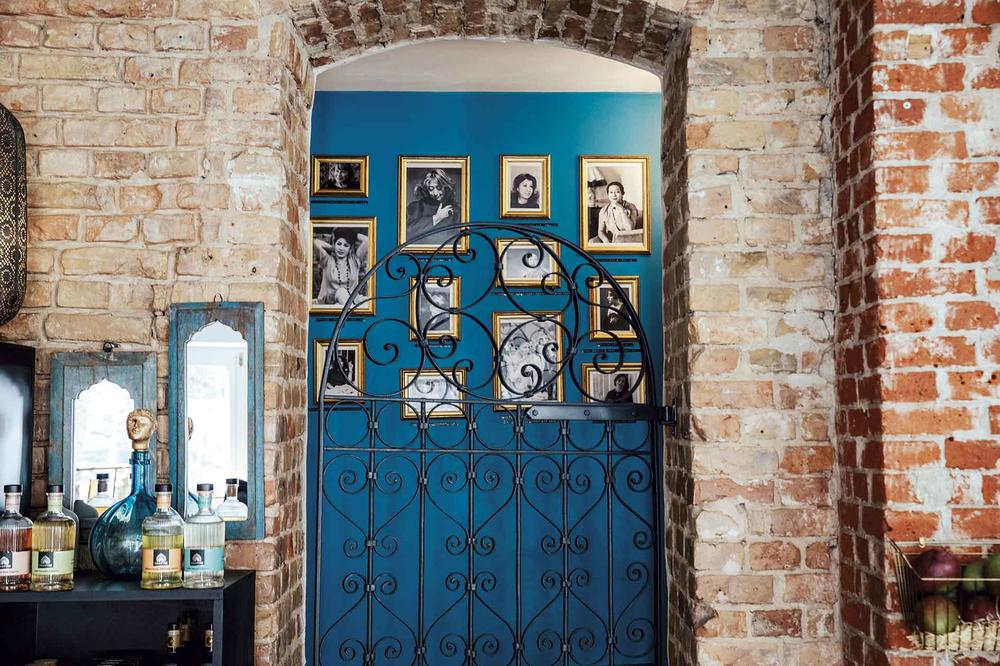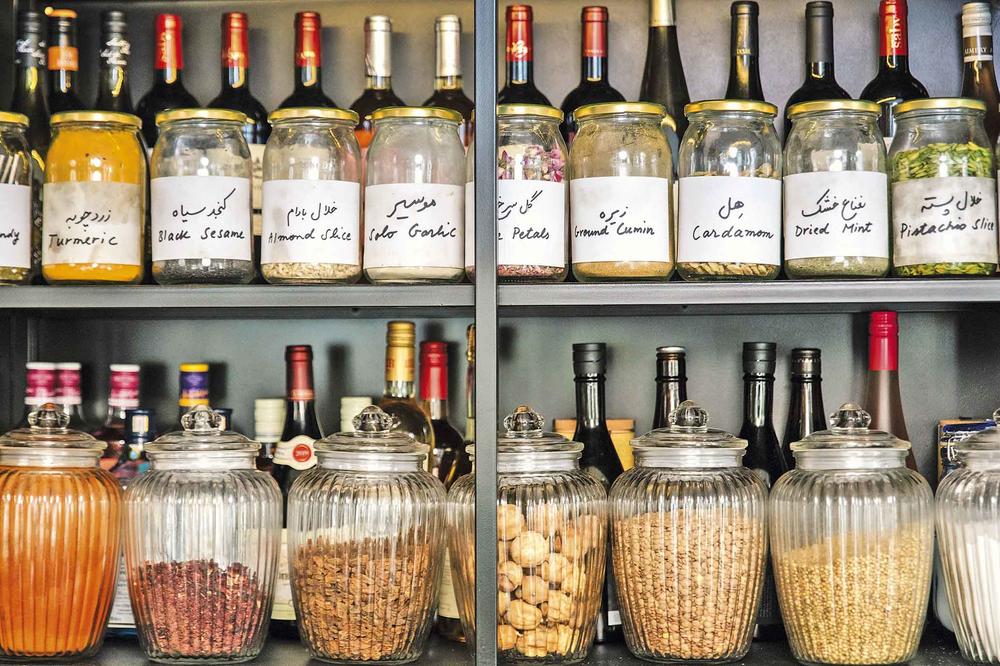"You can plan a revolution at the dinner table"
Meteorologist Sahar Sodoudi was an assistant professor of urban climate at Freie Universität - today she and her twin sister Forough offer cultural education, cooking classes, and catering with the "Dr & Dr Middle Eastern Culture and Food Lab."
May 24, 2023
wir: Dr. Sodoudi, your life has completely changed direction several times, the first time already when you were a child: in 1980, your parents returned to Iran from Berlin with you and your twin sister Forough - after the Islamic Revolution. That surprised me.
Sahar Sodoudi: My parents really wanted to return to their homeland after they finished their studies. In retrospect, it was the wrong decision.
wir: Was it a big culture shock?
Sahar Sodoudi: Not that big. We often had visitors from Iran during our time in Germany. And as children, we made friends quickly. But our teacher forbade us to speak German, so we completely forgot it.
wir: You have a bachelor's degree in physics and a master's degree in meteorology. Why did you choose these subjects?
Sahar Sodoudi: I was already very good at physics and mathematics in school and later gave private lessons in these subjects in addition to my studies.
wir: And meteorology?
Sahar Sodoudi: Cloud formation was my passion at school - especially the shape of cumulus congestus clouds in Tehran: these are cluster clouds just before a thunderstorm.
wir: In 2001 came the second change of direction: you went back to Berlin. In the late 1990s, you had clashed with the system in Iran. In 1998, the morality police arrested you because your headscarf allegedly didn't fit properly. In 1999, you took part in a sit-in at the university, which the regime broke up by force. Did you want to leave or did you have to?
Sahar Sodoudi: My sister and I have always been political and have always fought. But we didn't come to Berlin for political reasons. I simply didn't have a PhD opportunity in meteorology in Iran at the time.
wir: Your sister came with you - would you have gone without her?
Sahar Sodoudi: Probably. For me, it was a career question. The prospect of a better future and better career opportunities also persuaded Forough to come to Germany. She actually already had a doctoral position in seismology at Tehran University, but then also applied again for a position in Germany.
wir: Why Berlin, why Freie Universität?
Sahar Sodoudi: While researching my master's thesis, I came across the work of Prof. Dr. Manfred Geb from the Institute of Meteorology at Freie Universität. It was about large-scale weather systems and omega blocks. I really wanted to work with him. At some point I asked him if I could write my PhD thesis with him.
wir: What was it like arriving in Germany and at Freie Universität?
Sahar Sodoudi: At my institute, no one spoke English; there were no foreign students there at the time. So I learned German again very quickly, but it was a difficult time. Before I could even continue with my doctoral thesis, I had to take a German exam and a knowledge exam - also in German - because not all my degrees were recognized.
wir: What was the topic of your doctoral thesis?
Sahar Sodoudi: I studied how accurately a European weather model predicts heavy rainfall in Iran. This is important for better risk management, for example in Iranian agriculture.
Almost all of the Food Lab's furnishings come from Iran: the iron gate to the checkroom, for example, is an original garden gate, and the recurring blue color is meant to recall the small pools of water in Iranian front gardens.
Image Credit: Miriam Klingl
wir: In 2013, you became a junior professor of urban climate research. What did you deal with in the process?
Sahar Sodoudi: An important question in urban climate research is: How should we build so that we don't negatively affect the urban microclimate? Germany is also getting hotter. On tropical summer nights, heat islands in the street canyons hold in the heat, people sleep badly, their health suffers.
wir: You also did research on Tempelhofer Feld, Berlin's largest inner-city green space. What did you find out?
Sahar Sodoudi: On summer nights, Tempelhofer Feld is colder than Tiergarten. During the day, the many trees in the Tiergarten provide shade, but at night the heat accumulates underneath. On the field, on the other hand - a huge grassy area with almost no shade - it gets very hot during the day, but at night the heat can escape unhindered back into the atmosphere. The field acts like a refrigerator for the city at night.
wir: During your time at Freie Universität, you promoted many research collaborations in the Middle East. Can you give an example?
Sahar Sodoudi: One of my favorite projects was the "Urban Climate Labs." We established 18 of them in the Middle East, and I taught local people urban climate modeling on the computer. The Labs are still there today - so it's a sustainable project.
wir: Your academic biography in Berlin seems very straightforward: doctorate, research assistant, junior professor for urban climate research. But in 2019 came the third change of direction. What happened?
Sahar Sodoudi: On the one hand, I was very frustrated. Science in Germany is still a male domain. Women, especially foreign ones, are discriminated against. I have had this experience myself several times. Many women, also German women, female professors told me that they had to fight a lot. Not everyone makes it. I don't know this culture from my home country. Of course there is a patriarchal system there. But if a woman makes an effort, she is accepted; men and women meet as equals. I was also tired of sitting on appointment committees where many knew from the start who would most likely get the job. Nevertheless, the positions had to be formally advertised. The poor people who applied! On the other hand, I always wanted to do something in the field of culture. I realized I was getting older, and at some point you have to start. One Friday night at the dinner table, I said to my sister: now is the time. And Forough replied: I'm quitting on Monday. She was executive director of the "Berlin Mathematical School" at the time.
wir: Then in June 2019, your food lab "Dr & Dr" took off. How did it start?
Sahar Sodoudi: At first, we only had an Instagram profile, but no store. That's why we only offered catering at first, and the cooking classes came later.
wir: Where did you learn to cook so well yourself - and why were you sure catering would work?
Sahar Sodoudi: I learned to cook from my mother and my grandma, and I always cooked with my students during field trips and measurements as part of the courses at the university.
wir: Was it clear from the beginning that the food should also convey the culture?
Sahar Sodoudi: Yes. We only accept catering orders that are also about conveying culture. If people just want to get full, we refuse. We want to achieve goals, not just sell food.
wir: Why is cultural mediation so important to you?
Sahar Sodoudi: We believe that the culture of the Middle East, especially Iran, is misrepresented in Germany. Its fascinating subtleties are hidden behind politics and religion. Everyone knows about the Middle East conflict, but hardly anyone knows about the high culture behind it. We thought: If we - two female scientists - cannot convey the culture, who can? Hence the "Dr & Dr" in our name.
wir: What role does food play in Iranian culture and society?
Sahar Sodoudi: In Iran, everything happens at the dinner table. You can plan a revolution at the dinner table. The meal lasts an hour, two hours, you eat slowly, talk about the day and enjoy.
wir: How do you actually like German cuisine?
Sahar Sodoudi: I'll be honest: It's not really my thing. But I admire the Germans for what they can do with potatoes. And I think it's great that you can get to know so many different cuisines in Germany. There are also many international restaurants in Iran, but they are not authentic. Iranians almost always run the restaurants. That's because the country has little contact with other countries. No one wants to move there and live: Why would he there if the government is so bad?
wir: How did you come up with this place here in Kreuzberg?
Sahar Sodoudi: We really wanted to go to Kreuzberg because it is so international. When we visited the store, we learned by chance that an Iranian artist had designed the facade of the building. Of course, we liked that even more.
Whether black sesame, cardamom or dried mint: It's all ready for cooking.
Image Credit: Bernd Wannenmacher
wir: Can you tell us something about the ambience of the store?
Sahar Sodoudi: Everything comes from Iran: cookware, plates and cutlery. The tiles are hand-painted according to the pattern of the Golestan Palace in Tehran. Only the colors have been slightly changed. The iron gate to the checkroom is an original garden gate, the wooden structure above the cooking area is a traditional "shade". The recurring blue color is meant to remind us of the small pools of water in many Iranian front gardens, where watermelons and pomegranates are stored for guests.
wir: Lab means experimenting, after all. What are you experimenting with?
Sahar Sodoudi: One example: Iranian dishes are very time-consuming. We try to simplify the recipes, reduce cooking time, and use foods available in Germany that can be used to achieve the same taste. We don't throw anything away: leftover vegetables, for example, we pickle as torshi. Sustainability is part of our concept, and we also teach that in our cooking classes.
wir: Who comes to the Food Lab?
Sahar Sodoudi: 90 percent Germans, 10 percent international audience. We offer cooking classes and events for groups, but also private dining - then we cook. Each course has a name, for example "Tehran meets Tel Aviv."
wir: And what can course participants expect?
Sahar Sodoudi: They learn a lot about Iranian food culture - how to cook with saffron, or how to prepare overturned rice. That's a lot of fun. But the highlight is the moment when people start talking to each other at the dinner table. At the beginning of the meal, we always tell our guests: Start slowly, the night is long. Iranian music is always there from the beginning. And we talk about culture, literature, calligraphy ....
wir: ... also about the current situation in Iran? Should we call it a revolution?
Sahar Sodoudi: It is a revolution, we are convinced of that. Forough and I are fighting here by being the voice of our compatriots in Iran. We convey to our guests what is happening there.
wir: It's been a bit quiet lately ...
Sahar Sodoudi: No, it hasn't. In Tehran, for example, many women now go out without headscarves. But the men now wear headscarves, out of solidarity. Reforms are no longer effective. People don't want this government anymore. This government is finished. In a few months, it will be over.
wir: What will you do when the mullahs are gone?
Sahar Sodoudi: Then I will go back to Iran immediately.
wir: Would that be the fourth change of direction then?
Sahar Sodoudi: Not quite. "Dr & Dr" should continue to exist. We want to organize trips to Iran and show people places they don't know, but which have great cultural and culinary significance. Regardless of the political developments, we have developed our own spice blend, our online store is about to launch, and we are writing a cookbook, which of course is not only about cooking. Our team is growing - there are now nine of us.
The interview was conducted by Daniel Kastner



